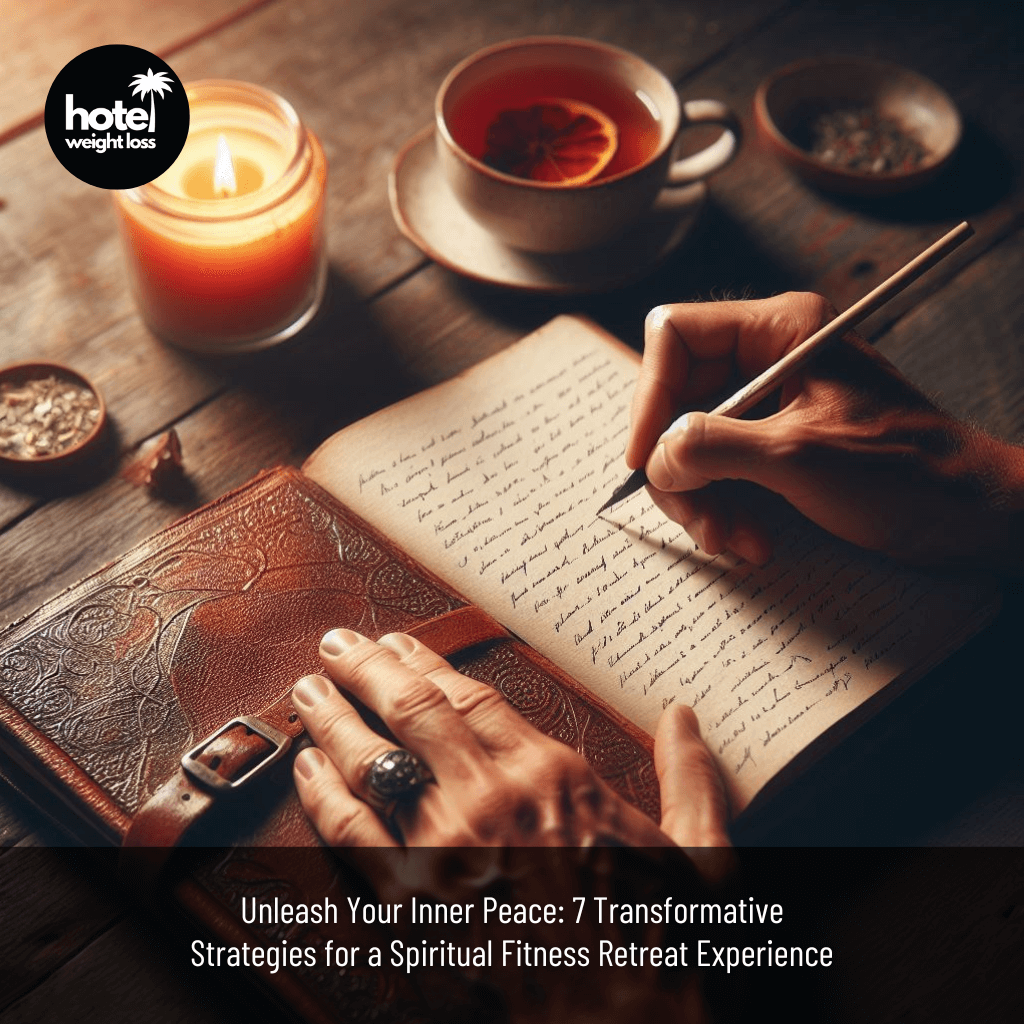Travelling can be a whirlwind of new experiences, delicious (but often unhealthy) foods, and disrupted routines. While it’s important to loosen up and enjoy yourself on vacation, neglecting your well-being can leave you feeling sluggish and out of sorts upon your return.
This is where the concept of a spiritual fitness retreat comes in. By incorporating practices that nourish your mind, body, and soul, you can return from your travels feeling refreshed, rejuvenated, and ready to tackle life’s challenges with renewed vigour.
Critical Takeaways:
- Spiritual fitness retreats combine physical activity with mindfulness practices to promote holistic well-being.
- Engaging in these practices during travel can help combat the negative effects of disrupted routines and unhealthy eating habits.
- Spiritual fitness retreats offer a structured environment to learn new techniques and deepen your self-awareness.
In this comprehensive guide, we’ll explore seven transformative strategies to make the most of your spiritual fitness retreat experience. Whether you’re a seasoned traveller seeking a deeper connection or a newcomer curious about the benefits, these tips will help you design a retreat that caters to your specific needs and goals.
1. Setting Intentions: Charting Your Path to Inner Peace
The foundation of any successful spiritual fitness retreat lies in setting clear intentions. What do you hope to achieve during your time away? Do you seek greater clarity, reduced stress, or a deeper connection to your inner self?
According to a study published in the Journal of Personality and Social Psychology, individuals who set specific and measurable goals are significantly more likely to achieve them [1]. Take some time before your retreat to reflect on your aspirations. Jot down your intentions in a journal and revisit them throughout your stay.
Silence Your Inner Critic: Cultivating Self-Compassion
The journey towards inner peace often involves confronting negative self-talk. Retreats provide a safe space to practice self-compassion, a practice shown by researchers at the University of California, Berkeley, to reduce stress and improve emotional well-being [2].
Meditation and mindfulness exercises can be powerful tools for cultivating self-compassion. By observing your thoughts without judgment, you can begin to detach from negativity and embrace a kinder, more accepting inner voice.
Embrace the Power of Gratitude
Gratitude is a cornerstone of spiritual well-being. Studies published in The Journal of Positive Psychology demonstrate the link between gratitude and increased happiness and life satisfaction [3].
During your retreat, take time each day to reflect on the things you’re grateful for. This could be anything from the beauty of nature to the kindness of strangers. Keeping a gratitude journal can further enhance the benefits of this practice.
Unplugging and Reconnecting
In today’s hyper-connected world, it’s easy to feel constantly bombarded by information and stimuli. Spiritual fitness retreats encourage you to “unplug” from technology and reconnect with yourself and your surroundings.
Consider putting your phone away for designated periods during your retreat. This will allow you to be fully present in the moment and appreciate the beauty and serenity of your environment.
2. Nourishing Your Body: Food as Fuel for the Soul
Food plays a vital role in both physical and spiritual well-being. Many spiritual fitness retreats emphasize healthy, mindful eating practices. This often involves consuming fresh, local, and whole foods that nourish your body and support your overall health.
Mindful Eating: Savoring Each Bite
Mindful eating is the practice of paying close attention to the physical and emotional sensations associated with eating. This allows you to savour your food and eat until you’re comfortably satisfied rather than overstuffed.
Studies published in Appetite demonstrate that mindful eating can lead to weight loss and improved digestion [4]. Retreats often incorporate mindful eating exercises into their mealtimes, helping you develop a healthier relationship with food.
Exploring New Culinary Horizons
Many spiritual fitness retreats are situated in exotic locations with unique culinary traditions. Embrace this opportunity to try new and healthy foods that nourish your body and expand your palate.
Embrace this opportunity to try new and healthy foods that nourish your body and expand your palate. Many retreat centres offer cooking classes or workshops that teach you how to prepare these dishes at home. This allows you to integrate these healthy practices into your everyday life long after your retreat has ended.
Detoxification and Cleansing (Optional)
Some spiritual fitness retreats offer optional detoxification or cleansing programs. These programs typically involve consuming specific foods or beverages designed to eliminate toxins from the body.
Important Note: While some individuals find detoxification programs beneficial, it’s crucial to consult with your doctor before embarking on any such program, especially if you have any underlying health conditions.
Hydration: The Lifeblood of Well-Being
Staying hydrated is essential for optimal physical and mental function. Retreats often encourage participants to drink plenty of water throughout the day. This helps to flush toxins from the body, improve cognitive function, and boost energy levels.
3. Moving Your Body: The Power of Physical Activity

Physical activity is a cornerstone of any spiritual fitness retreat. Exercise releases endorphins, natural mood-lifters that promote feelings of happiness and well-being. Additionally, physical activity can help reduce stress, improve sleep quality, and boost energy levels.
Finding Your Flow: Exploring Different Movement Practices
Spiritual fitness retreats often offer a variety of movement practices to cater to different fitness levels and interests. This could include yoga, Pilates, hiking, dance classes, or even nature walks.
Experiment with different activities to discover what resonates most with you. The key is to find movement that feels enjoyable and sustainable in the long run.
Connecting with Nature: The Healing Power of the Outdoors
Many spiritual fitness retreats are situated in beautiful natural settings. Immersing yourself in nature is a powerful way to reduce stress, improve mood, and boost creativity.
Hiking, swimming in natural bodies of water, or simply spending time in a quiet garden can all be incredibly beneficial for your well-being.
Mindful Movement: Connecting Body and Mind
Many of the movement practices offered on spiritual fitness retreats incorporate mindfulness principles. This could involve focusing on your breath, tuning into the sensations in your body, and moving with intention.
This practice of mindful movement helps you connect with your body and appreciate its capabilities. It can also be a powerful tool for cultivating present-moment awareness and reducing stress.
Building Sustainable Habits: Making Movement a Part of Your Life
A key aspect of any spiritual fitness retreat is learning how to integrate healthy practices into your everyday life. Many retreats offer guidance on creating sustainable exercise routines that fit into your schedule and lifestyle.
4. Cultivating Stillness: The Power of Meditation and Mindfulness
Meditation and mindfulness practices are essential components of spiritual fitness retreats. These practices help to cultivate inner peace, reduce stress, and improve focus.
Meditation Basics: Learning to Quiet the Mind
Meditation is the practice of focusing your attention and quieting the mind. There are many different meditation techniques, some of which may be offered on your retreat.
Even a few minutes of daily meditation can significantly reduce stress and improve emotional well-being [5]. Many retreats offer workshops or guided meditations to help you learn the basics.
Mindfulness in Everyday Life: Bringing Awareness to Each Moment
Mindfulness is the practice of paying attention to the present moment without judgment. It involves being aware of your thoughts, feelings, and bodily sensations without getting caught up in them.
Integrating mindfulness into your daily life can help you manage stress more effectively, savour positive experiences, and appreciate the beauty of everyday moments. Retreats often incorporate mindfulness exercises into various activities, helping you develop this valuable skill.
Silence and Solitude: Creating Space for Inner Reflection
Spiritual fitness retreats often incorporate periods of silence and solitude into their schedules. This time can be incredibly valuable for introspection and reflection. You can use this time to journal, meditate, or simply sit quietly and observe your thoughts and feelings.
Digital Detox: Disconnecting to Reconnect
In today’s digital age, it’s easy to feel constantly bombarded by information and stimuli. Many retreats encourage participants to “detox” from technology and focus on the present moment.
This allows you to reconnect with yourself and your surroundings. While a complete digital detox might not be feasible for everyone, consider setting aside specific times during your retreat to disconnect from your devices.
5. Embracing the Power of Community: Connection and Support on Your Spiritual Journey
Spiritual fitness retreats offer a unique opportunity to connect with like-minded individuals on a similar path to self-discovery and well-being. This sense of community can be incredibly supportive and motivating.
The Power of Shared Experiences: Building Connections with Others
Participating in group activities and workshops on a spiritual fitness retreat can foster a sense of camaraderie and shared experience. Sharing your thoughts and feelings with others who understand your journey can be incredibly validating and supportive.
Learning from Others: Embracing Diverse Perspectives
Spiritual fitness retreats often attract individuals from all walks of life with varying perspectives and experiences. Engaging in respectful conversations with others can broaden your horizons and expose you to new ideas and approaches to well-being.
Building Lasting Connections: Friendships Beyond the Retreat
The connections you forge on a spiritual fitness retreat can extend far beyond your stay. Many retreats offer online communities or alumni groups where you can connect with fellow participants and continue to support each other on your wellness journeys.
The Power of Vulnerability: Sharing Your Authentic Self
Creating genuine connections with others often requires a degree of vulnerability. Spiritual fitness retreats can provide a safe space to share your authentic self with others, fostering deeper and more meaningful relationships.
6. Enhancing Your Sleep: Rest and Rejuvenation for the Mind and Body
Quality sleep is essential for both physical and mental well-being. Many spiritual fitness retreats prioritize practices that promote healthy sleep habits.
Establishing a Relaxing Bedtime Routine
Many retreats incorporate relaxing bedtime routines into their schedules. This could involve activities such as gentle yoga, meditation, or taking a warm bath. Establishing a consistent bedtime routine can signal to your body that it’s time to wind down and prepare for sleep.
Creating a Sleep-Conducive Environment
The quality of your sleep environment can significantly impact your ability to get a good night’s rest. Many retreat centres prioritize creating sleep-conducive environments with comfortable beds, blackout curtains, and minimal noise.
Digital Detox Before Bed
The blue light emitted from electronic devices can interfere with sleep quality. Many retreats encourage participants to avoid using electronic devices for at least an hour before bedtime. Consider reading a book, taking a bath, or meditating instead.
Disconnecting to Reconnect with Yourself
Quality sleep is essential for promoting mental clarity and emotional well-being. By prioritizing sleep during your retreat, you’ll return home feeling refreshed and better equipped to handle life’s challenges.
7. Integrating Your Learnings: Bringing Spiritual Fitness into Your Daily Life
Perhaps the most important aspect of any spiritual fitness retreat is learning how to integrate your newfound practices into your everyday life.
Creating a Personalized Wellness Plan
Many retreats offer workshops or guidance on creating a personalized wellness plan. This plan should incorporate practices that resonate with you and fit realistically into your schedule and lifestyle.
Finding an Accountability Partner
Having an accountability partner can be a powerful tool for staying on track with your wellness goals. This could be a friend, family member, or even an online support group.
Start Small and Celebrate Milestones
Significant lifestyle changes are often best implemented gradually. Start by incorporating small, sustainable changes into your routine and celebrate your milestones along the way.
Seeking Ongoing Support
Maintaining a healthy lifestyle can be challenging. Don’t be afraid to seek ongoing support from resources such as therapists, yoga instructors, or meditation apps.
Conclusion
Spiritual fitness retreats offer a unique opportunity to nurture your mind, body, and soul. By incorporating the strategies outlined above, you can design a transformative retreat experience that leaves you feeling refreshed, rejuvenated, and ready to embrace a healthier, happier you.
FAQs
-
What is a spiritual fitness retreat?
Spiritual fitness retreats combine physical activity with mindfulness practices to promote holistic well-being. These retreats offer a structured environment to learn new techniques for stress reduction,
-
What is a spiritual fitness retreat? (continued)
…self-discovery, and spiritual growth. They often take place in beautiful natural settings and emphasize healthy eating habits and restful sleep.
-
Who can benefit from a spiritual fitness retreat?
Spiritual fitness retreats are open to anyone seeking to improve their overall well-being. Whether you’re looking to reduce stress, improve your physical health, or deepen your spiritual connection, a retreat can offer valuable tools and support.
-
What should I pack for a spiritual fitness retreat?
The specific items you’ll need will vary depending on the location and activities offered by your retreat. However, some general packing tips include comfortable clothing for exercise and relaxation, a reusable water bottle, a hat, sunscreen, insect repellent, and a good book. Many retreats also recommend bringing a journal for reflection.
-
Do I need to be in good physical condition to participate in a spiritual fitness retreat?
Most spiritual fitness retreats offer a variety of activities to cater to different fitness levels. Be sure to inquire about the specific activities offered by the retreat you’re considering and communicate any limitations you may have. Many retreats also offer modifications for various exercises.
-
What is the difference between a spiritual fitness retreat and a spa vacation?
While both spiritual fitness retreats and spa vacations offer opportunities for relaxation and rejuvenation, there are some key differences. Spiritual fitness retreats typically incorporate a stronger focus on mindfulness practices, self-discovery, and personal growth. Spa vacations, on the other hand, often emphasize pampering treatments and physical relaxation.
-
How much does a spiritual fitness retreat cost?
The cost of a spiritual fitness retreat can vary widely depending on the location, duration, and amenities offered. Do your research and compare prices before booking your retreat.
-
How do I find a spiritual fitness retreat?
Searching online using keywords like “spiritual fitness retreat” or “wellness retreat” is a good starting point. You can also search for retreats in specific locations or that cater to your particular interests. Reading reviews from past participants can also be helpful in making your decision.
-
Do I need to bring anything special for the meditation and mindfulness practices?
Most retreats will provide any necessary props or equipment for meditation and mindfulness practices. However, some participants find it helpful to bring a comfortable yoga mat or meditation cushion.
-
What if I’m not religious? Can I still benefit from a spiritual fitness retreat?
Absolutely! Spiritual fitness retreats are open to people of all faiths and backgrounds. The focus is on personal well-being and self-discovery, not on any specific religious doctrine.
Ready to take the next step on your spiritual fitness journey? Consider incorporating a Hotel Weight Loss program into your retreat experience. Our KetoNeuroGenic (KNM) Weight Loss Program combines the power of the ketogenic diet with hormone balancing, organ support, and brain training to help you achieve lasting weight loss success.
Contact Hotel Weight Loss today at Hotelweightloss.com to learn more about how our program can enhance your spiritual fitness retreat and empower you to live a healthier, more fulfilling life.




